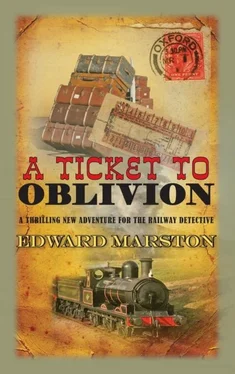Edward Marston - Ticket to Oblivion
Здесь есть возможность читать онлайн «Edward Marston - Ticket to Oblivion» весь текст электронной книги совершенно бесплатно (целиком полную версию без сокращений). В некоторых случаях можно слушать аудио, скачать через торрент в формате fb2 и присутствует краткое содержание. Жанр: Исторический детектив, на английском языке. Описание произведения, (предисловие) а так же отзывы посетителей доступны на портале библиотеки ЛибКат.
- Название:Ticket to Oblivion
- Автор:
- Жанр:
- Год:неизвестен
- ISBN:нет данных
- Рейтинг книги:5 / 5. Голосов: 1
-
Избранное:Добавить в избранное
- Отзывы:
-
Ваша оценка:
- 100
- 1
- 2
- 3
- 4
- 5
Ticket to Oblivion: краткое содержание, описание и аннотация
Предлагаем к чтению аннотацию, описание, краткое содержание или предисловие (зависит от того, что написал сам автор книги «Ticket to Oblivion»). Если вы не нашли необходимую информацию о книге — напишите в комментариях, мы постараемся отыскать её.
Ticket to Oblivion — читать онлайн бесплатно полную книгу (весь текст) целиком
Ниже представлен текст книги, разбитый по страницам. Система сохранения места последней прочитанной страницы, позволяет с удобством читать онлайн бесплатно книгу «Ticket to Oblivion», без необходимости каждый раз заново искать на чём Вы остановились. Поставьте закладку, и сможете в любой момент перейти на страницу, на которой закончили чтение.
Интервал:
Закладка:
CHAPTER THREE
Dominic Vaughan had been wrong about the Beckford sisters. Of the two, he’d found Cassandra infinitely more patient, intelligent yet submissive and therefore far more suitable as the wife of a husband drawn to the groves of academe. It was not that he thought Paulina unattractive. On the contrary, he willingly conceded that, in purely physical terms, she was unequalled but it was a glaring beauty that unnerved instead of enticed him. Paulina also had a patrician air that was much more at home in Burnhope Manor than in the cloistered world of the Oxford college where Vaughan had been a fellow at the time. While one sister would surely have rejected his proposal of marriage, the other had accepted it with muted pleasure and been — in the early years — exactly the sort of spouse he’d envisaged as his preferred partner in life.
Motherhood had wrought a profound change in both sisters. The arrival of Imogen, an only child, turned the serene Paulina into a nervous, ever-watchful chaperone, determined to protect her daughter from what she perceived as the rampant wickedness of the outside world. Cassandra, too, had undergone a kind of metamorphosis. Having given birth to three children, she’d become more strident, more assertive and less ready to accept her husband’s decisions without first questioning them. Since he hated confrontation of any kind, Vaughan had given ground to her time and again. Even though he now enjoyed the elevated status of being Master of University — the oldest college endowment in Oxford — he lacked authority on the domestic front. Cassandra was always prone to challenge his judgement and advance her own plausible alternatives to his plans. Everyone at the college was aware of the marital imbalance in the Master’s Lodging. It had led to waspish comments from his detractors in the Senior Common Room.
‘Don’t just sit there, Dominic,’ she complained. ‘Do something.’
‘What am I supposed to do, my love?’
‘Anything is better than hiding away in your study.’
‘I need to check these accounts from the bursar.’
‘Heavens!’ she exclaimed. ‘Must the safety of our niece take second place to the erratic mathematics of the bursar? Don’t you care about Imogen?’
‘I care a great deal, Cassandra,’ he said, rising from his desk, ‘and I’ve already been to the chapel to pray for her deliverance. But, in practical terms, all that was needful has already been done by your good self. You promptly set the wheels of the investigation in motion and I applaud you for that.’
‘Somebody had to do so,’ she snorted.
‘Are you insinuating that I would have failed to do likewise?’
‘Frankly, I am.’
‘That’s unjust of you.’
‘Is it? You couldn’t even be bothered to meet Imogen at the station.’
‘You and Emma formed a perfectly adequate welcoming party.’
‘Your presence would have given it more body and you’d have been able to remonstrate with the stationmaster and the driver of the locomotive. In your absence, I had to tackle them both.’
‘I don’t see that either of them could be blamed,’ he said, reasonably. ‘If you set on them, they have my sympathy. You can be unnecessarily sharp at times, my dear. I’ve mentioned it to you before.’
‘You’re doing it again!’ she protested. ‘You’re worrying about two mere railway employees instead of about your niece. What if she’s been killed or kidnapped? What if Imogen has been ravished ? Supposing,’ she continued, voice soaring a whole octave, ‘that it had been Emma who boarded that train then disappeared? Wouldn’t that have engaged your attention?’
‘You know quite well that it would, Cassandra. You chastise me unfairly. I have the greatest concern for Imogen — and for her maid, of course. It’s a shared plight and we must remember that. But having no idea what happened to them, I’m determined not to fall prey to the wild imaginings that you have just listed. Let me finish,’ he went on quickly as she was about to speak. ‘All that we can realistically do is to watch, pray and rely on the goodness of our Creator. The situation may look baffling but there may well be a perfectly logical explanation.’
‘That is patently untrue.’
‘We must never surrender to despair.’
She rolled her eyes. ‘Your words push me perilously close to it.’
‘That’s unkind and unwarranted, Cassandra.’
She had the grace to look shamefaced and even mouthed an apology. Anger then gave way to a moment of weakness and she allowed him to embrace her in his usual clumsy way. For all his faults — she’d enumerated them many times — she knew that she’d married a good, honest, conscientious Christian gentleman, wedded to scholarship and devoted to his family. When she pulled away and looked up at him, her ire had cooled.
‘What will Marcus do?’ she asked, softly.
‘I should imagine that he’ll take care to say nothing to alarm your sister when she is unwell. Secondly, he’ll curse the railway company and wish that he never got involved with the enterprise. The OWWR has presented him with an unbroken series of shocks and disappointments, the culmination of which is that it now appears to have mislaid his daughter.’
‘It’s done more than simply mislay her, Dominic. They should be prosecuted.’
‘We must first establish what offence — if any — they committed. But,’ he went on, ‘to return to your original question about what action he’ll take, Marcus will do what he always does in a crisis. He’ll find the ideal person to pour oil on what are extremely troubled waters.’
Unlike the cab driver who drove them to Burnhope Manor, Colbeck refused to be cowed by the presence of aristocracy. It was an article of faith with him that a police investigation merited the utmost respect. When the driver unthinkingly took his passengers to the servants’ entrance, therefore, Colbeck insisted that they went instead to the front door. It gave the detectives an opportunity to appraise the house. Built towards the close of Elizabeth’s reign, it had been designed by someone who was enthralled by the sumptuous Hardwick Hall in Derbyshire. Indeed, the manor was conceived as a smaller version of it with the same bold lines as Hardwick and the same stunning expanse of glass. There were so many windows in the front elevation that the whole edifice seemed to glisten in the afternoon sunshine.
Victor Leeming looked up at it in dismay. After the ordeal of rail travel, he’d enjoyed the comparative luxury of a horse-drawn vehicle and it had helped him to relax. The sight of Burnhope Manor made every muscle tense instantly. Colbeck, on the other hand, was not intimidated. When they stood outside the front door, he pulled on the bell rope with conviction. The butler soon answered the summons, looking askance at Colbeck but reserving his most disapproving glance for Leeming. On learning who the visitors were, he conducted them along a corridor lined with gilt-framed portraits, then took them into the library. Left alone, they looked around the long, well-proportioned room with its leather-bound tomes stacked neatly on oak shelves covering three walls. A large globe stood in a corner.
Colbeck’s primary interest was in the books and he took a quick inventory of their titles. Leeming, however, was transfixed by the full-length portrait of Sir Marcus Burnhope that hung above the magnificent marble fireplace. One admonitory finger in the air, he looked as if he were addressing a large audience and the fierce glint in his eye made Leeming flinch slightly. Sir Marcus exuded a sense of wealth, breeding and power. The real-life version was even more daunting.
‘Ah, there you are at last!’ he said, sweeping into the room like a gust of wind. ‘What on earth kept you?’
Читать дальшеИнтервал:
Закладка:
Похожие книги на «Ticket to Oblivion»
Представляем Вашему вниманию похожие книги на «Ticket to Oblivion» списком для выбора. Мы отобрали схожую по названию и смыслу литературу в надежде предоставить читателям больше вариантов отыскать новые, интересные, ещё непрочитанные произведения.
Обсуждение, отзывы о книге «Ticket to Oblivion» и просто собственные мнения читателей. Оставьте ваши комментарии, напишите, что Вы думаете о произведении, его смысле или главных героях. Укажите что конкретно понравилось, а что нет, и почему Вы так считаете.












